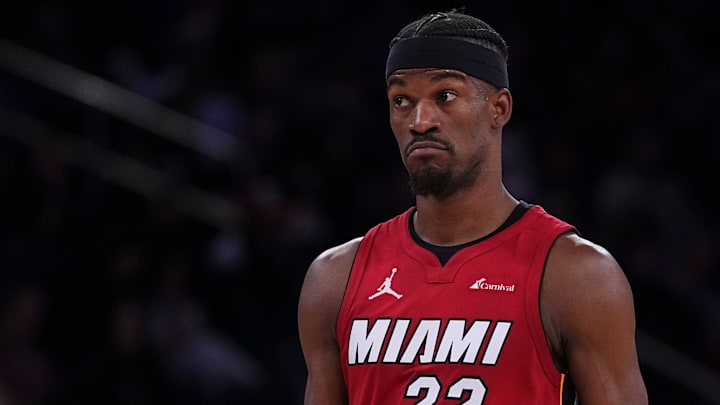The Miami Heat will try to snap their six-game losing streak in Monday night’s game against the Phoenix Suns. Here are five stats that explain the team’s longest losing streak of the season.
40%
This is Miami’s shooting percentage on open shots, as defined by NBA.com (shots without a defender within 6 feet of the shooter). That’s the second-worst clip in the league during this stretch, and almost five percentage points off Miami’s season average.
The good news? The Heat are generating the third-most open shots during this stretch. So the shot quality has been better than maybe the eye test has indicated, but that’s what happens when teams go through a shooting slump.
Beyond the make-or-miss factor, Miami’s problem has been that it hasn’t been compensating for those misses with easier points in transition or at the foul line. The Heat have generated close to nothing in transition during this stretch, too often taking their time to get into offense even after an opponent miss or turnover.
The Heat are also averaging only 17.7 free-throw attempts in their last six games, the league’s worst mark over that stretch. That’s down from their season average of 23.2, which ranks 12th.
21.4%
This is Jimmy Butler’s usage rate during this stretch, which is not the usage rate of a star. In fact, it’s fourth on his own team behind Bam Adebayo, Tyler Herro and Duncan Robinson.
Over these last six games, Butler is averaging 19.3 points on 12 field goal attempts and 5.3 free throw attempts, 4 assists and 4.8 rebounds. These are not star numbers. These are Tobias Harris numbers.
Harris is a fine player, but the Heat need Butler to play like a star, not a role player. At least if they are going to continue to run offense through him.
Butler is 34 and starting to show his age (declining usage rate, field goal percentage and free-throw rate) so some slippage is expected. But there has to be a higher water level when he’s on the court.
29th
This is the Heat’s ranking in defensive rating over the last six games. Yikes.
Some of this is lucky opponent shot-making and the fact that the Heat aren't getting set because they are defending off of misses too often. That will level out with time.
But if something is bothering Erik Spoelstra, it’s probably that the Heat aren’t boxing out and finishing defensive possessions when they do get a stop. Over these last six games, the Heat’s defensive rebounding rate has plummeted to near the bottom of the league. The Heat are giving up an astonishing 29.4 putback points every 100 opponent misses during this stretch, according to Cleaning The Glass – by far the worst mark in the league.
The Heat are usually an elite defensive-rebounding team. They have to be. Because of their personnel, these Heat will never be an elite man-to-man defense or shot-blocking group. They don’t have the size or athletes.
They are usually the harder-working and more detail-oriented group, but the misses have led to frustrations and overlooking the little things they must do to be a strong defensive team.
5-10
This is Miami’s record in 15 games this season with Tyler Herro, Bam Adebayo and Butler. It’s led many to wonder if the Heat would be better off bringing Herro off the bench.
There’s no doubt that the Heat’s offense has looked disjointed, and with the Heat’s top scorers all preferring to shoot from the mid-range, it’s also inherently inefficient.
Replacing Herro with Duncan Robinson would help balance the starting lineup’s shot chart. Unlike Herro, Robinson prioritizes shots from beyond the arc or at the rim. The Heat have an offensive rating of 119.7 when Butler, Adebayo and Robinson share the court, per CTG.
That drops to a ho-hum 115.6 with Herro in Robinson’s place, which is how the Heat start games.
But Spoelstra believes the team’s ceiling is with Herro, Butler and Adebayo playing off each other. Herro offers more off-the-dribble juice than Robinson and often bails out the offense with self-created buckets in a way no other Heat player can (with the possible exception, now, of Terry Rozier). It’s easy to forget that Herro was averaging 25 points per game before his ankle sprain.
Enough smart people believe the Heat should bring Herro off the bench that I’m willing to entertain it, but I’ve never been able to fully get there. Teams have to work through things to grow. If Herro, Butler and Adebayo cannot learn to coexist, then the Heat don’t have a chance anyway, and will have bigger questions to answer this offseason.
14.5
This is the difference between Rozier’s points-per-game average in Charlotte (23.2) versus in Miami (8.7).
A big part of the decline is that Rozier is shooting 30% since joining the Heat. That’s a big reason why the Heat’s open shot percentage is so down, but it will get better (Rozier shot 43.6% during his Hornets tenure).
No reason to panic here. Rozier is still finding his footing in Miami’s disjointed offense and it can’t be easy. There have been multiple possessions in his first three Heat games when he’s run into a teammate or looked unsure of where to go. That stuff will come with time.
I thought the Rozier-Adebayo would be a bit more turnkey than it has been. Those two haven’t gotten on the same page yet, but there have been flashes.
If there’s a positive from Rozier’s first Heat stretch, it’s that he’s averaging 5 assists per game, an expected dip from the 6.6 he averaged in a bigger role in Charlotte this season. His playmaking impact has been instant.
